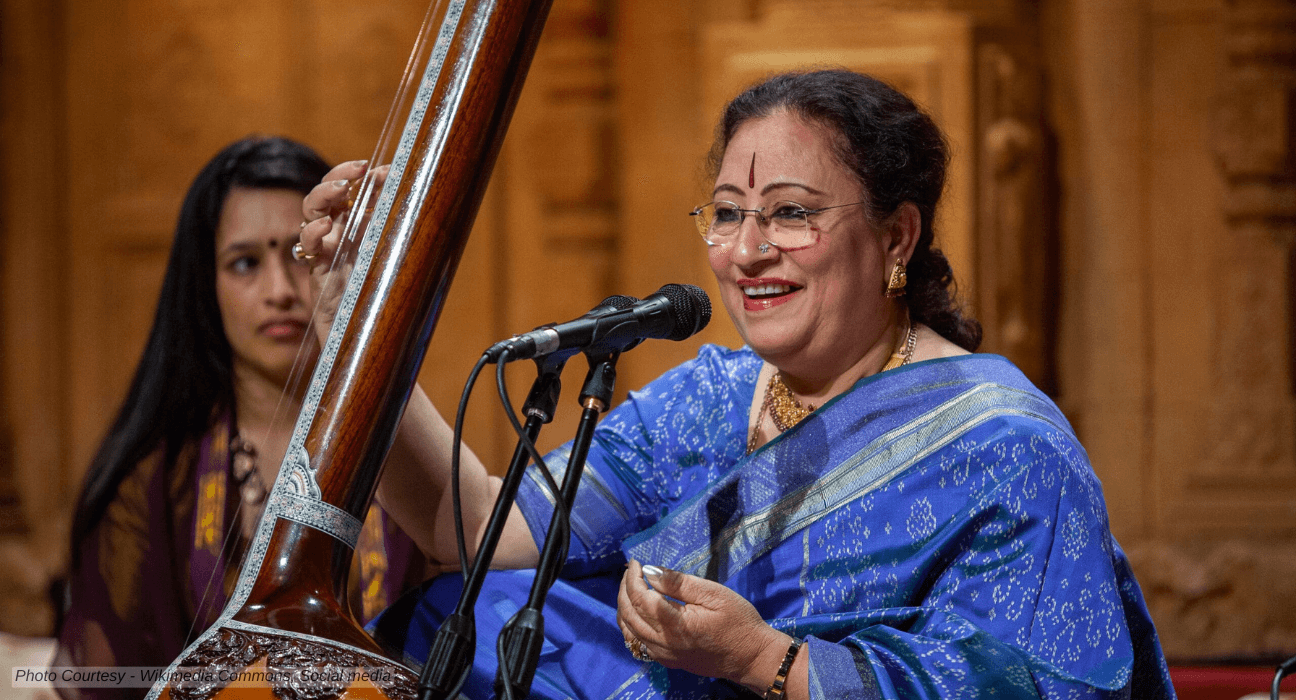Begum Parveen Sultana is one of the most accomplished and celebrated classical singers of her time, known for her enchanting and powerful voice. She also sang for a few films. Who can forget the mesmerising “Kaun gali gayo Shyam” in “Pakeezah (1972)” or one of cinema history’s finest love songs, Hame tum se Pyaar Kitna in “Kudrat (1981)”
Early Life and Training
Begum Parveen Sultana was born on 24th May 1950 (A lots of sources quotes her birthday on 10th July, 1950), in Nagaon, Assam, into a family that was originally from Afghanistan. Her father, Ikramul Majid, was himself a musician, while her mother, Maroofa Begum, was a homemaker. Her father noticed her inherent talent at an early age and started teaching her the basics of music. Sultana attended Mission School in Nagaon, where her interest in music flourished. She balanced academics with singing practice under her father’s guidance. After some time, she began her training under Birendra Kumar Phukan and Hiren Sarma before going to Kolkata to learn from Pandit Chinmoy Lahiri.
Despite training in nine gharanas, she closely followed Ustad Bade Ghulam Ali Khan and Ustad Salamat Khan of Patiala Gharana. Her voice, which effortlessly traverses octaves, has not only captivated audiences in India but has also echoed in the halls of international fame.
Parveen Sultana On Stage

Sulatana’s first live performance came when she was only 12 years old. In 1973, she became a disciple of Ustad Dilshaad Khan, who helped her master the ragas and improve her voice. Besides the live music and music concerts, Parveen Sultana also recorded for music labels including HMV, Polydor, Music India, Bharat Records, Auvidis, and Magnasound, among others.
Her discography is as varied as it is illustrious, featuring works like “An Hour of Ecstasy,” “Ethereal Duo,” “Narayani (Raga Narayani),” “Young Voices of India,” “Begum Parveen Sultana (Raga Salag Varali todi/Raga Lalita/Raga Khamaj thumri),” “Enchanting Bhajans (Raga Rageshri/Bhajan/Bhajan),” “Parveen (Raga Rageshri/Raga Mishra Mand),” “Genius of Parveen Sultana,” and many more. Each album showcases her versatility, whether through the intricate ragas or the soul-stirring thumris.
Parveen Sultana In Films
Parveen Sultana’s professional career took off with her performance in the Assamese film “Morom Trishna.” She made her Hindi film debut with the classical rendition of “Peetal Ki Mori Gaagri” in K. A. Abbas’s “Do Boond Paani (1971),” under the music direction of Jaidev. She sang “Ram Kare More Saiyan Hon Aise (Khoj, 1971)” under Usha Khanna. She also sang Piya Ki Gali Laage Bhali (Parwana, 1971) under Madan Mohan. Her breakthrough came with her rendition of thumri “Kaun Gali Gayo Shyam” in Mishra Khamaj, in Pakeezah (1972), under Naushad Saab. She also sang “Naa Tum Hato Naa Hum Haten (Shadi Kar Lo, 1975) for Jaidev.


Perhaps the most famous song in Hindi films that brought her widespread recognition is “Humein Tumse Pyaar Kitna.” The song from “Kudrat (1981),” won her the Filmfare Best Female Playback Award, etching her name in the history of Indian cinema.
Over the year, Begum Parveen Sultana went on to sing selected songs like “Yeh Bahut Khushi ki Nishaani hai (Sharda, 1981),” “Bichhurat mose Kanha (Vijeta, 1982),” “Shubh Ghadi aayi re (Razia Sultan, 1983),” “Shab-e-Intezaar Mein Kyu Hai Gumsum Tamannaaye,” “Ae Mohabbat Yunhi To Tu Badnaam Nahi,” “Dev Puji Puji Hindu Muye,” Ashray (1983), Prem Ka Granth Padhaoon Sajanwa (Tohfa Mohabbat ka, 1988), “Aan milo Sajna (Gadar: Ek Prem Katha, 2001),” and “Vaada tum se hai Vaada (1920).”
Personal Life
Parveen Sultana is married to Ustad Dilshad Khan, her guru; together, they have a daughter, Sahdab Khan. Her collaborations with her husband have also been noteworthy. The blending of her impeccable soprano with his innovative tenor created many magical jugalbandis.
Parveen Sultana’s contributions to music have been recognised with prestigious awards. She get the Padma Shri in 1976, the Padma Bhushan in 2014, and the Sangeet Natak Akademi Award in 1999.
Begum Parveen Sultana on IMDB













Leave feedback about this